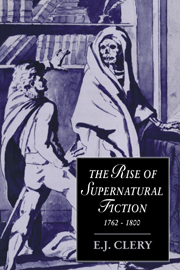Book contents
- Frontmatter
- Contents
- List of illustrations
- Acknowledgements
- Introduction
- PART I TECHNIQUES OF GHOST-SEEING
- PART II THE BUSINESS OF ROMANCE
- PART III THE STRANGE LUXURY OF ARTIFICIAL TERROR
- PART IV MAGICO-POLITICAL TALES
- 9 The terrorist system
- 10 Conspiracy, subversion, supernaturalism
- Afterword
- Notes
- Bibliography
- Index
- CAMBRIDGE STUDIES IN ROMANTICISM
10 - Conspiracy, subversion, supernaturalism
Published online by Cambridge University Press: 03 December 2009
- Frontmatter
- Contents
- List of illustrations
- Acknowledgements
- Introduction
- PART I TECHNIQUES OF GHOST-SEEING
- PART II THE BUSINESS OF ROMANCE
- PART III THE STRANGE LUXURY OF ARTIFICIAL TERROR
- PART IV MAGICO-POLITICAL TALES
- 9 The terrorist system
- 10 Conspiracy, subversion, supernaturalism
- Afterword
- Notes
- Bibliography
- Index
- CAMBRIDGE STUDIES IN ROMANTICISM
Summary
In his essay ‘Reflections on the Novel’ the Marquis de Sade famously connects the rise of supernatural fiction with the events of the French Revolution:
This genre was the inevitable product of the revolutionary shocks with which the whole of Europe resounded. For those who were acquainted with all the ills that are brought upon men by the wicked, the romantic novel was becoming somewhat difficult to write, and merely monotonous to read: there was nobody left who had not experienced more misfortunes in four or five years than could be depicted in a century by literature's most famous novelists: it was necessary to call upon hell for aid in order to arouse interest, and to find in the land of fantasies what was common knowledge from historical observations of man in this iron age. But this way of writing presented so many inconveniencies [sic]! The author of The Monk failed to avoid them no less than did Mrs Radcliffe; either of these two alternatives was unavoidable; either to explain away all the magic elements, and from then on to be interesting no longer, or never raise the curtain, and there you are in the most horrible unreality.
The passage is of interest not only for its insistence on a direct political—fictional correspondence, but for the ironic juxtaposition of ‘revolutionary shocks’ with the novel-reader's jaded tastes and clamour for ever-new products, a device which suggests de Sade shares the contemporary intimation that the emergence of a mass political movement might have something to do with the expanding demand-led publishing industry discussed in the previous chapter. This is a subject to which I will return.
- Type
- Chapter
- Information
- The Rise of Supernatural Fiction, 1762–1800 , pp. 156 - 171Publisher: Cambridge University PressPrint publication year: 1995

